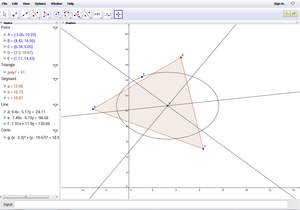GeoGebra
GeoGebra is an interactive geometry, algebra, statistics and calculus application, intended for learning and teaching mathematics and science from primary school to university level. GeoGebra is available on multiple platforms, with apps for desktops (Windows, macOS and Linux), tablets (Android, iPad and Windows) and web.
 | |
 GeoGebra 4.4.3.0 (HTML5 version) | |
| Developer(s) | Markus Hohenwarter et al |
|---|---|
| Stable release | 6.0.596 (24 July 2020) [±] |
| Repository | |
| Written in | Java, HTML5 |
| Operating system | Windows, macOS, ChromeOS, Linux; also a web app |
| Type | Interactive geometry software |
| License | Non-commercial freeware; portions under GPL, CC-BY-NC-SA |
| Website | geogebra |
GeoGebra's creator, Markus Hohenwarter,[1] started the project in 2001 as part of his master's thesis at the University of Salzburg. After a successful Kickstarter campaign, GeoGebra expanded its offering to include an iPad, an Android and a Windows Store app version.[2] At the same year it incorporated Bernard Parisse's Giac into its CAS view.[3] The project is now open-source and multi-lingual, and Hohenwarter continues to lead its development at the University of Linz.
GeoGebra includes both commercial and not-for-profit entities that work together from the head office in Linz, Austria, to expand the software and cloud services available to users.
Interactive geometry, algebra, statistics and calculus
GeoGebra is an interactive mathematics software suit for learning and teaching Science, technology, engineering, and mathematics from primary school up to the university level. Constructions can be made with points, vectors, segments, lines, polygons, conic sections, inequalities, implicit polynomials and functions, all of which can be edited dynamically later. Elements can be entered and modified using mouse and touch controls, or through an Input Bar. GeoGebra can store variables for numbers, vectors and points, calculate derivatives and integrals of functions, and has a full complement of commands like Root or Extremum. Teachers and students can use GeoGebra as an aid in formulating and proving geometric conjectures.
GeoGebra's main features are:
- Interactive geometry environment (2D and 3D)
- Built-in spreadsheet
- Built-in Computer algebra system (CAS)
- Built-in statistics and calculus tools
- Scripting hooks
- Large number of interactive learning and teaching resources at GeoGebra Materials
GeoGebra Materials Platform
The GeoGebra Materials platform[4] is a cloud service that allows users to upload and share GeoGebra applets with others. GeoGebra Materials was originally launched as GeoGebraTube in June 2011, and was renamed in 2016. As of April 2016 the service hosts more than 1 million resources, 400,000+ of which are public. "Materials" include interactive worksheets, simulations, games and e-books created using GeoGebraBook.
GeoGebra Materials can be also exported in several formats, including SVG, Animated GIF, Windows Metafile, PNG, PDF and EPS, as well as copied directly to the clipboard. GeoGebra can also generate code for use in LaTeX files.
Licensing
GeoGebra's source code is licensed under the GNU General Public License (GPL) and all other non-software components are under Creative Commons BY-NC-SA.[5][6] Commercial use is subject to a special license and collaboration agreement.
Community
The International GeoGebra Institute (IGI) is the nonprofit arm of the GeoGebra Group. The institute coordinates research, development, translation and deployment efforts of the GeoGebra system across a global network of user groups at universities and non-profit organizations, as well as provide certification to GeoGebra experts and trainers.
Awards
- Archimedes 2016: MNU Award in category Mathematics (Hamburg, Germany)
- Microsoft Partner of the Year Award 2015: Finalist, Public Sector: Education (Redmond, WA, USA)
- MERLOT Award for Exemplary Online Learning Resources – MERLOT Classics 2013 (Las Vegas, Nevada, USA)
- NTLC Award 2010: National Technology Leadership Award 2010 (Washington D.C., USA)
- Tech Award 2009: Laureate in the Education Category (San Jose, California, USA)
- BETT Award 2009: Finalist in London for British Educational Technology Award
- SourceForge.net Community Choice Awards 2008: Finalist, Best Project for Educators
- AECT Distinguished Development Award 2008: Association for Educational Communications and Technology (Orlando, USA)
- Learnie Award 2006: Austrian Educational Software Award for "Wurfbewegungen mit GeoGebra" (Vienna, Austria)
- eTwinning Award 2006: 1st prize for "Crop Circles Challenge" with GeoGebra (Linz, Austria)
- Les Trophées du Libre 2005: International Free Software Award, category Education (Soisson, France)
- Comenius 2004: German Educational Media Award (Berlin, Germany)
- Learnie Award 2005: Austrian Educational Software Award for "Spezielle Relativitätstheorie mit GeoGebra" (Vienna, Austria)
- digita 2004: German Educational Software Award (Cologne, Germany)
- Learnie Award 2003: Austrian Educational Software Award (Vienna, Austria)
- EASA 2002: European Academic Software Award (Ronneby, Sweden)
See also
References
- JKU | IDM » Markus Hohenwarter, Jku.at, 2013-06-13, retrieved 2013-08-29
- GeoGebra for tablets (iPad and Android), Kickstarter.com, retrieved 2013-08-29
- Kovács, Zoltán; Parisse, Bernard (2013-11-25), Giac and GeoGebra: improved Gröbner basis computations (PDF), RICAM Institute, Linz, Austria, retrieved 2015-01-23
- GeoGebra Materials: http://www.geogebra.org/materials
- "GeoGebra License". International GeoGebra Institute. Retrieved 23 February 2014.
- "Sources for used libraries". International GeoGebra Institute. Retrieved 22 April 2016.
External links
| Wikimedia Commons has media related to: |